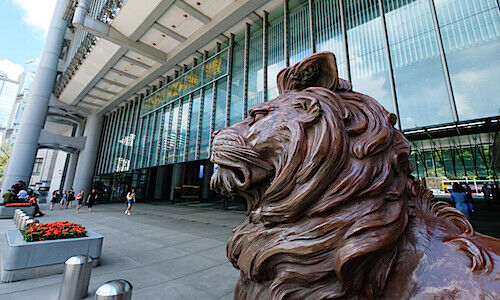HSBC’s Break-Up Call: De-Globalization in a Divided World
HSBC is facing calls by its largest shareholder, Chinese insurer Ping An, to break up its business by separating the Asia operations. Will reduced diversification serve the 157-year-old lender well in an increasingly divided world?
Last week, Ping An – HSBC’s largest shareholder with 9.2 percent ownership – reportedly approached the bank's board of directors in private about spinning off its Asia business for a separate listing in Hong Kong.
The Chinese insurance giant effectively confirmed its engagement with HSBC with a public statement issued yesterday.
«We support a debate about the future of the bank,» a spokesperson for Ping An said. «We want shareholders to participate in the debate and to propose solutions for HSBC. Ping An supports all reforms and proposals from investors that can help HSBC’s operations and long-term growth.»
HSBC Response
Although HSBC did not comment on Ping An's involvement, it was quick to defend its strategy which group chief executive Noel Quinn recently said depended on the bank acting as a «global franchise» with a presence in three key regions: Asia, the Middle East and the U.K.
«We believe we’ve got the right strategy and are focused on executing it,» an HSBC spokesperson said in response to the reports about Ping An’s proposed plan. «Delivering on this strategy is the fastest way to generate higher returns and maximize shareholder value.»
Diversification Benefits
The most obvious immediate downside to an Asia break-up is the loss of diversification benefits and increased concentration risk.
Although Asia has served well as a growth engine for banks to accumulate new clients, assets and profits, the region has been a source of increasing volatility in recent times. These challenges were especially evident from global banks’ first quarter results this year as troubles in China – property debt worries, tightening tech regulations, ongoing Covid restrictions, to name a few – were unanimously cited as the reason for lower regional profits.
Some global banks with a sizeable presence in Asia still managed to achieve an overall increase in profits through diversified dependence on growth from other regions – most notably the Middle East. Examples include Standard Chartered and UBS, which posted its best first quarter results since 2007 despite a more than 38 percent drop in Asia pre-tax profit.
Global Brand
Another concern about an Asia break-up is the impact that it will have on HSBC’s standing as a global financial institution.
Although it has decreased its footprint in recent years – HSBC has sold its U.S. retail banking business and is in the process of completing the sale of its French retail bank – the Asia-focused British lender is still a major global financial institution and many of its clients rely on its connectivity worldwide.
«We’re the largest trade bank in the world by quite a degree. We’re one of the largest global payment houses in the world. We’re one of the largest foreign exchange banks in the world,» Quinn said during the recent annual shareholders meeting.
«One must recognize that much of that trade and payments activity is into and out of Asia. I think we’re uniquely positioned to help, particularly, corporate customers and some of our international retail customers' trade between the West and the East and that is what we’ve been doing for 156 years.»
Political Crossfire
Nonetheless, there is a growing case that a less globalized HSBC could bode well for its future outlook, especially due to increasing geopolitical risk.
The bank has been the subject of scrutiny in the past few years due to its involvement in various controversial issues such as the detention of Huawei chief financial offer Meng Wanzhou or the public backing of the national security law in Hong Kong.
Taiwan Risk
Of note is the timing of Ping An’s proposals which coincides with recent reports of Beijing’s concerns about U.S. sanctions.
According to a «Financial Times» report citing unnamed sources, Chinese regulators held an emergency meeting on April 22 with domestic and foreign banks – including HSBC – to discuss how to protect the country’s overseas assets from U.S.-led sanctions that were similar to those imposed against Russia following its invasion of Ukraine.
Although officials and attendees did not mention specific scenarios in the meeting, one anonymous individual briefed on the meeting spoke about potentially triggering sanctions through a Chinese invasion of Taiwan.
«If China attacks Taiwan, decoupling of the Chinese and western economies will be far more severe than [decoupling with] Russia because China’s economic footprint touches every part of the world,» the source said.
Ping An Shareholders
The ongoing focus on political concerns also casts a spotlight on Ping An’s shareholders which are believed to include individuals linked to Beijing elites.
A 2012 «New York Times» report famously claimed that relatives and associates of former Chinese Premier Wen Jiabao controlled stakes in the insurance company that were worth at least $2.2 billion in 2007.
In the first quarter of 2022, Asia accounted for two-thirds of HSBC's global pre-tax profits which fell 28 percent to $4.2 billion.




























